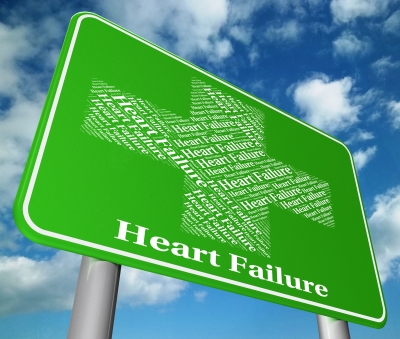All You Need To Know About Living With Heart Failure

Guest post provided by registered nurse Lydia Nabwami.
Being diagnosed with heart failure can be frightening for you and your loved ones. To many people, the word heart failure sounds like the heart no longer works or having a broken heart and life coming to an end. It can raise all sorts of questions about what you can and can’t do and what your future is going to be like. However, having heart failure means that for some reason your heart is not pumping enough blood around the body to meet the body’s demands for blood and oxygen.
Why Heart Failure Happens
The most common reason heart failure occurs according to British Heart Foundation (BHF) is because your heart muscle has been damaged. Examples of how your heart becomes damaged are, after a heart attack and other heart conditions such as coronary artery disease and high blood pressure.
Symptoms of Heart Failure
Living with heart failure, you will experience the following symptoms:
- Shortness of Breath – You will have shortness of breath during everyday activities like walking, while at rest or sleeping which may be sudden and wake you up. You will often feel anxious and restless and have difficulty breathing while lying flat. To help this, you can to prop up the upper body and head on two pillows. Shortness of breath happens because the heart can’t keep up with the supply of blood, therefore, it causes fluid to leak into the lungs. If this fluid is left unmanaged, it can build and spread to your stomach area and sit beneath your lungs. This reduces the lung’s ability to expand and makes you short of breath.
- Swelling of your extremities- Swelling of your feet, ankles, legs, stomach, lower back areas and weight gain are not uncommon symptoms. Swelling happens because as blood flows out of the heart, it slows down. The blood coming back to the heart through the veins backs up causing fluid to build up in the body tissues.
- Generalized weakness- You may feel unusually tired or weak most times and find it difficult with everyday activities such as walking, climbing stairs, shopping. Weakness happens because the heart cannot pump enough blood to meet all the needs of the body tissues. The body diverts blood away from less vital organs, particularly muscles in the limbs, and sends it to the heart and brain.
Managing Heart Failure
Heart failure is a long-term condition, and usually, there’s no cure. You can do a few things to help cope with the condition.
- Learn how to manage symptoms – The best thing you can do is to learn how to manage your symptoms and keep your condition under control. Symptom management is different for everyone but will help you do many of the things you enjoy in life.
- Find Support in Family and Friends – It’s helpful to have the support of family and friends who understand your condition. Talking openly and honestly to them about how you feel can be a great source of both practical and emotional support that can help you all move forward.
- Take your Medicine as Prescribed – The British Heart Foundation recommends managing your heart failure medication as prescribed to control your symptoms.
- Make Small Changes – BHF also recommends making some small changes in life and coming to terms with these changes. For example, getting some help with housework, changing jobs to something suitable for you will help you feel more in control and make your health your number one priority.
Heart failure is a very frightening heart condition with various unpleasant symptoms. Getting organized, coming to terms with the condition and taking control of your heart condition are very important factors in managing heart failure.
Image courtesy of Stuart Miles at FreeDigitalPhotos.net
10 Tips on What to Avoid During the Holidays to Prevent Holiday Heart Syndrome

Heart-related deaths increase during the holidays with 33% more deaths occurring in December and January.
Avoid these 10 activities to protect your heart from holiday heart syndrome this holiday:
1. Stress
While the holidays are often happy times spent with family, it’s also a time of increased stress as you prepare for the festivities. The busyness is not going to ebb. You need to make relaxation a priority by scheduling breaks into your calendar. Use this scheduled time for whatever relaxation method works best for you… meditation, exercise, deep breathing, a nap. Don’t underestimate the importance of managing stress.
2. Sleep deprivation
Ongoing sleep deprivation is connected to increased risk for high blood pressure, diabetes, stroke, and heart disease. To get better sleep during and after the holidays go to bed and get up and the same time each day, stop eating three hours before bedtime, avoid fluids two hours before bedtime, and make your bedroom as dark as possible.
Know Your Healthy Holiday Cooking Oils

The next several weeks are the most fattening time of the year for most Americans. We’ll be stocking our kitchens with butter and oils, to prepare those giant family feasts and holiday treats we all love. We now know that it’s okay – even advised – to embrace a certain amount of fat in our diets. But the information on what constitutes “good” fat and “bad” fat is rapidly changing!
Jonny Bowden, PhD, CNS, (aka “The Nutrition Myth Buster”) offered to help us understand which fats we should be eating. Dr. Jonny is a nationally known expert on weight loss, nutrition and health. He’s a board-certified nutritionist with a master’s degree in psychology and the best-selling author of 15 books on health, healing, food and longevity, including his latest book (co-written with Dr. Steven Masley), “Smart Fat: Eat More Fat, Lose More Weight, Get Healthy Now!”
Lisa Nelson, RD: Butter or margarine? Which is the best choice?
Dr. Bowden: “Without question, butter. Margarine is one of the dumbest nutritional experiments in history; it was based on the now-obsolete fear of healthy, saturated fats. Butter from grass-fed cows is a perfectly healthy fat; it also contains cancer-fighting fats such as CLA.”
Lisa Nelson, RD: Olive oil is good for everything, right?
Dr. Bowden: “Absolutely not. There are different grades, from plain old “olive oil” to “extra virgin olive oil”. They vary enormously in their ability to stand up to heat. The very expensive extra virgin olive oil, which contains the most polyphenols, should never be used at high heat. With olive oil, as you move up the scale in quality – olive oil, virgin olive oil, extra virgin olive oil – you move DOWN the scale in its ability to stand up to heat. So, plain old olive oil is fine for higher heat application, virgin for medium heat and extra virgin ideally shouldn’t be heated. At the very most you could drizzle it on what you’re cooking at the last minute but ideally, it’s for drizzling and salads. You pay a lot extra for the careful low-heat processing to preserve the delicate health-giving olive polyphenols so it makes no sense to heat the oil and destroy them!”
Lisa Nelson, RD: Should we be using the cheap vegetable oil we all have in our pantries?
Dr. Bowden: “No. It’s highly pro-inflammatory and processed within an inch of its life, so that it basically contains nothing of any value. Some vegetable and seed oils — especially the cold pressed organic kinds such as cold-pressed sesame oil — are fine once in a while. But the exclusive reliance on cheap processed oils such as corn oil, soybean oil or safflower oil contributes mightily to inflammation, which is a promoter of every single degenerative disease.”
Lisa Nelson, RD: What about more exotic oils like coconut, palm and macadamia?
Dr. Bowden: “I love every one of these. Macadamia nut oil is similar to olive oil in that it’s high in monounsaturated fat, but has a higher smoke point. Ditto with avocado oil. Coconut oil has many anti-microbial fats and is great for energy. And Malaysian palm oil is one of my favorite oils of all: it’s sustainable, non-GMO (unlike soy and corn oils), has no trans-fats, is high in carotenoids and tocotrienols, and stands up to moderate heat.”
Lisa Nelson, RD: Is Crisco ok?
Dr. Bowden: “About as OK as a diet of corn dogs and Pepsi. It’s the worst stuff imaginable. It’s much better to use healthy saturated fats: real, organic lard, Malaysian palm oil, coconut oil. They don’t form any really negative compounds that are bad for our bodies.”
Lisa Nelson, RD: Is it worth spending extra money on expensive oils?
Dr. Bowden: “They’re worth it! The better oils are less processed, made with less heat and chemicals, and much more likely to retain whatever health compounds were in them in the first place.”
Lisa Nelson, RD: If someone were to keep one or two oils stocked in their pantry all times, which two healthy cooking oils would you recommend and what would each be best used for?
Dr. Bowden: “I would use avocado oil for high heat, Malaysian palm oil for medium heat and extra virgin olive oil for dressings and drizzling.”
Dr. Bowden adds that nutrients found in Malaysian palm oil are well researched for their benefits on brain and liver health. Those studies can be found at www.palmoilhealth.org.
Selecting heart healthy fats is just one step you can take to promote healthy cholesterol levels. Access additional steps via the free e-course How to Lower Cholesterol in 8 Simple Steps.
All the best,
Lisa Nelson RD
Health Pro for HealthCentral
7 Dietary Choices to Better Manage Heart Failure
 Heart failure affects about 5.7 million Americans.
Heart failure affects about 5.7 million Americans.
Approximately half who are diagnosed with heart failure die within five years of diagnosis.
To manage heart failure, it is important to…
- Take medications as prescribed
- Stop smoking
- Maintain physical activity
- Lose weight (if overweight or obese)
- Limit alcohol intake
- Follow a heart failure diet
Here are 7 additional steps you can take to better manage heart failure risk…
Low Calorie Sweeteners in a Heart Healthy Diet
 The 2015-2020 Dietary Guidelines for Americans recommends a reduced intake of added sugars to less than 10% of total daily calories. If you consume a 2000 calorie diet, this is equal to less than 12.5 teaspoons of added sugar. The average American consumes 19.5 teaspoons of daily.
The 2015-2020 Dietary Guidelines for Americans recommends a reduced intake of added sugars to less than 10% of total daily calories. If you consume a 2000 calorie diet, this is equal to less than 12.5 teaspoons of added sugar. The average American consumes 19.5 teaspoons of daily.
The guidelines noted available scientific evidence finds FDA-approved no calorie sweeteners to be safe for the general population and an option for reducing added sugar intake.
In order for a low calorie sweetener to be identified as safe for the general population, it must undergo a wide range of tests to determine adverse effects at any dose during different stages of the life cycle. The level connected to an adverse effect must be identified to then define an amount that is without effect.
Whether or not a sweetener is approved for use in food products and beverages it must be proven safe for pregnant women and children.
The following low calorie sweeteners have been approved as safe:
Aspertame
Saccharin
Stevia
Sucralose
Low calorie sweeteners have been controversial with concerns about connections to weight gain, increased sweet cravings, and altered gut flora.
A lot of the controversy has been spurred by associations in observational studies being misinterpreted, inappropriate data extrapolations from research, and/or experimental protocol not being physiologically relevant.
Continue reading
Health Benefits of Sprouts and Shoots
 Not only do shoots and sprouts add flavor and texture to meals, they also contribute needed nutrients. Bean sprouts are typically more calorie dense than seed sprouts, but they also contribute more protein.
Not only do shoots and sprouts add flavor and texture to meals, they also contribute needed nutrients. Bean sprouts are typically more calorie dense than seed sprouts, but they also contribute more protein.
Research into the health benefits of shoots and sprouts is limited. However, recent studies are examining the anticarcinogenic and antioxidant powers of sulforaphane, a compound in sprouts. There is up to 100 times more sulforaphane in broccoli sprouts than mature broccoli.
Animal studies have seen sulforaphane inhibit breast cancer steam cell and prostate tumor growth, while decreasing oxidative damage.
A small study found bamboo shoots to lower cholesterol and LDL cholesterol levels.
Buying sprouts and shoots
Popular sprouts include mung beans, wheat, radish, broccoli, and alfalfa.
Popular shoots include pea vines and bamboo.
You will generally find a large selection of shoots and sprouts at your local farmers market and Asian stores.
Select shoots and sprouts that are plump and crisp. Avoid stringy, discolored, slimy, or limp shoots and sprouts.



